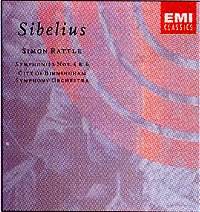Researching an article on Sibelius for this website
has occasioned me to find my CDs of his music and, while this particular
CD has probably been reviewed before (it was released in 1988), I wish
to write about it here.
This CD couples the symphony I find most difficult
to come to terms with and what I consider to be his greatest symphony.
The Fourth Symphony of 1911 is an enigma. One could
spend days trying to understand it. It sounds formless and, forgive
me, sometimes pointless. It gives the appearance of being structure-less
and yet has a lovely warm finale that borders on genius. Like a Wagner
opera it has wonderful moments but long uneventful episodes. It is an
introspective work full of very personal statements which none of us
will ever comprehend. That is what makes the puzzle and the enigma and
perhaps some frustration. The work is often grim as Barry Millington
says in his all too brief notes.
The Sixth Symphony of 1923 is another matter. It was
written during a time of seven years when Sibelius was ‘on the wagon’
and, therefore, not under the influence of alcohol and had also given
up smoking cigars. The clarity and logic of this symphony is apparent.
Again I have to agree with Millington that this symphony
is one of Sibelius’s most intriguing masterpieces. Personally, I rate
it as his greatest symphony although not his greatest orchestral work.
Tapiola, his last work, is the greatest and the Lemminkainen pieces
Op 22 are truly superb. Apart from what I consider a few weaknesses
in the finale the Violin Concerto is an absolute winner as is Pohjola’s
Daughter. The sheer beauty of the orchestration in Nightride and Sunrise
is a terrific achievement as well.
Taking into account the tremendous interpretation difficulties
in bringing off the Fourth Symphony Rattle does reasonably well. Karajan’s
performance was praised in some quarters but the best exponents are
Sir Colin Davis and Sir Alexander Gibson. Rattle’s weakness is his sforzandos,
some of which do not appear in the score. He exaggerates tone differences
and therefore distorts the music. Some of the slow and inhospitable
passages drag painfully as if Rattle is squeezing every strain of emotion
out of it.
And, of course, there is the problem of the finale.
Sibelius asks for bells and most conductors use a glockenspiel. Why?
The inclusion of bells is a fascinating study in itself.
Another of Sibelius’s great mysteries. This aside, I do like Rattle’s
tempi in the finale but the final pages disappoint. The tension evaporates
and that is a shame! Is it a symphony in the proper sense of the word?
The sound is gorgeous but the performance is variable.
Rattle fares better in the Sixth Symphony. Some
of the string playing is ravishing and Rattle will suddenly surge when
the score does not authorise it and when this happens it makes the music
sound cheap. He does capture some excitement but his style varies to
a worrying extent. Sometimes it sounds like Sibelius and sometimes it
sounds like a seedy vaudeville act. It is this inconsistency
that means that I cannot recommend the recording.
I worked with Norman Del Mar on this symphony and
in three extensive days got to know it intimately. I have loved
it ever since. Because of this revelatory experience, I am fussy about
other performances and these do not quite make the grade.
David Wright


